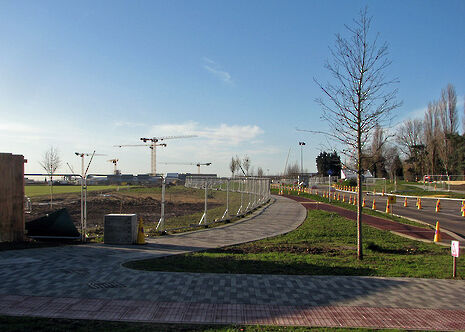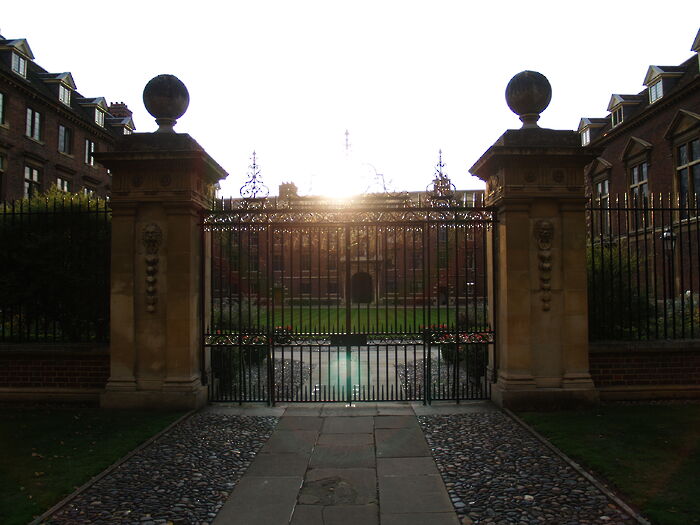Cambridge is immensely rich in property and wealth – let’s share it with the town
In his third column, Angus Satow argues that the stark dividing lines between town and gown should be eroded

In my first year at Cambridge I conducted my entire life on one road. My room, Sainsbury’s, Life and Cindy’s (tragic, I know) all followed one line down from Magdalene Bridge to Petty Cury. A saddening tale, to be sure, but also one that is symbolic of a wider malaise.
Cambridge is a siloed place, with the vast majority of University students (and often lecturers) completely divorced from the town they live in, indeed even from the city’s other university.
This is inscribed in the University’s history – it was founded by Oxford scholars forced out of the town by local residents. 800 years on, the divide persists. Take the example of nightclubs: they are broadly left to ‘townies’ at weekends, there is no overlap with Anglia Ruskin, and students even have their own names for some.
“Cambridge students lead alienated, stressed lives, divorced from the world around us. We can change that.”
The story is the same for activism, talks and events, and for the knowledge infrastructure of the University. There is one reality for the University, and another for everyone else.
Inequality is seared into the very heart of this place. Cambridge is home to one of the most extensive libraries in the world – but it is only open to some. It has art rooms and meeting spaces which many could only dream of – only open to some.
Needless to say this divide is entirely artificial. As we saw last week, the University relies on the labour provided by the town. The town is also, obviously, vital to our functioning. The question is not one of natural division but unnatural borders and a dynamic of oppression.
The University dominates the town. It owns most of the property in the central town, a territory de facto belonging to us. Community events such as the Festival of Ideas only take place under the patronage of the University.
Speaking with one community organiser, I was told of “the insidious power of Cambridge University” which makes local initiatives impossible without its backing. Moreover, there is little chance to speak out; doing so is likely to affect your funding.
Every prospect for the town is tied up with the University, leading to enrichment for capital and immiseration for the rest. In recent decades there has been talk of ‘the Cambridge phenomenon’ – the growth of a ‘Silicon Fen’ in and around Cambridge, as high-tech businesses across bioscience, medicine and technology flock to the City.
The Economist has praised this fusion of higher education and capitalism. For these free-market liberals, it is good for “the membrane between [the University’s] laboratories and Cambridge’s private firms to be as porous as possible.”
It comes at a price, however. The same article recognises that “property prices are rising faster in Cambridge than anywhere else in Britain”. Cambridge is rapidly becoming inaffordable for many of its residents, who are quite literally pushed to the margins of the city.
The University is complicit in this: it benefits from rent rises, and is an active proponent of the ‘high-tech Cambridge’ model. Take the new North West Cambridge site being built by the University. It meets criteria around sustainability and contributions to community life. But it is only really serving the University and its private research partners. While 6,000 people lounge on the council house waiting list, the site’s ‘affordable’ housing will be available only to those connected to the University.
This inequality is obscene. We need a social university integrated with and serving the town it lives in. This means an end to all exclusivity. On an academic level, we should open up Cambridge’s libraries to everyone. How much knowledge lies festering away on bookshelves? People want to learn, if only they are given the opportunity.
We could open up lectures to everyone. Many are in no way full – so why are experts in fascinating fields not being heard by more people? Our education system could be integrated with the town. While it may seem impossible now, the truth is that where there’s a will, there’s a way.
The infrastructure of the town could be open to everyone. Let’s open up college cantines to the town, let’s break bread together. Were the colleges open to all, they would no longer be eruptions of privilege and inequality blighting the landscape, but bastions of community.
Housing could be integrated. Earlier this year, activists in Oxford occupied a building belonging to Wadham College to house the homeless during the winter: Iffley Open House. Locals, students and the homeless all worked together for the common good – this is what a social university looks like. It is horrifying that so much of Cambridge’s estate remains empty while people freeze on the streets.
Integrated communities, integrated lives. The Cambridge homeless charity Jimmy’s runs a community allotment with Anglia Ruskin students – we could use college gardens to do the same. Cambridge students lead alienated, stressed lives, divorced from the world around us. We can change that.
Ultimately, however, it is not just an issue of habits. This is about material inequality. For a social Cambridge to replace this current model of outrageous inequality, we must give up our privileges. To abolish the town-gown divide, we must simply abolish the gown
 News / Police to stop searching for stolen Fitzwilliam jade17 April 2024
News / Police to stop searching for stolen Fitzwilliam jade17 April 2024 News / Copycat don caught again19 April 2024
News / Copycat don caught again19 April 2024 Interviews / ‘It fills you with a sense of awe’: the year abroad experience17 April 2024
Interviews / ‘It fills you with a sense of awe’: the year abroad experience17 April 2024 News / Night Climbers call for Cambridge to cut ties with Israel in new stunt15 April 2024
News / Night Climbers call for Cambridge to cut ties with Israel in new stunt15 April 2024 News / Acting vice-chancellor paid £234,000 for nine month stint19 April 2024
News / Acting vice-chancellor paid £234,000 for nine month stint19 April 2024





